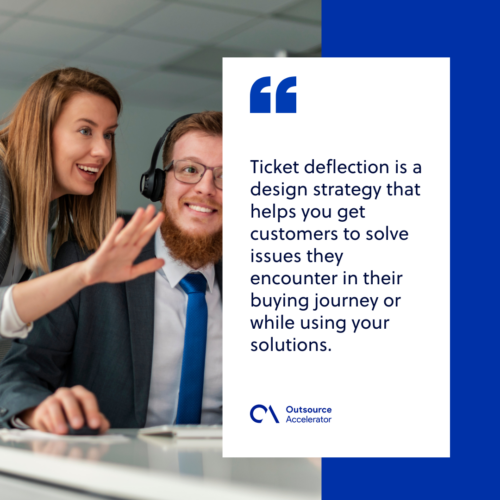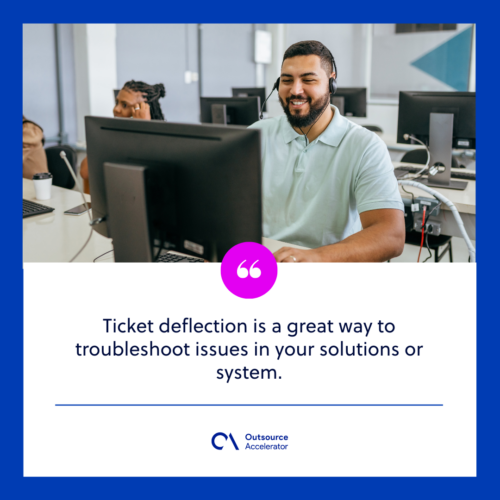A quick overview into ticket deflection

The customer experience is your main differentiator from other companies. It can make or break your reputation and customer’s approach depending on their experience interacting with your company.
There are other ways to provide a strong support strategy besides outsourcing customer service. One of the emerging approaches to improving service is ticket deflection.
Ticket deflection helps optimize your operation by saving you hours of ticket management headaches through automation and knowledge consolidation. It is an affordable way to save on labor costs while maintaining high service quality.
Ticket deflection defined
Ticket deflection is a design strategy that helps you get customers to solve issues they encounter in their buying journey or while using your solutions. They won’t be required to contact customer support.
Ticket deflection defined
This can help customers find answers fast without requiring dedicated round-the-clock assistance at the ready.
In customer service, it is best thought of as a self-service portal that can help customers independently find answers and lessen the burden on your customer service team.
This enables customers to find information on their own via a knowledge base, automated QuickSearch Bots, and other mechanisms.
Calculating ticket deflection rate
One of the most common ways to check on the state of ticket deflection performance is to use a formula to find out how accessible and accurate your resources are.
The ticket deflection ratio is the number of people who used your self-service portal content divided by the number of tickets. Monitoring and improving this key performance can help you maximize your resources and maintain an appropriately sized support team.

Ticket deflection strategies to improve customer experience
There are different ways to support clients in overcoming problems. Businesses can use different platforms to accomplish this.
Here are some ways to manage customer issues, keep response time down, and improve customer experience.
Calculating ticket deflection rate
Knowledgebase
A strong knowledge base is key to a good ticket deflection ratio. A repository of guides allows businesses to provide support instantly. This can come in the form of short guides, FAQs, or articles organized intuitively to help users find answers.
Knowledgebase platforms today can offer AI-powered and multi-language support to enable businesses to broaden their reach.
Chatbots
AI chatbots are a great way to help customers fix basic concerns without the involvement of a live agent. It directs users to an article in the website’s knowledge base with only a few keywords to type.
It also guides them in connecting with support agents for complex problems.
In-app guidance
In-app guidance provides support services to customers through short messages within a website or app.
It does not tap into a website’s knowledge base, unlike a chatbot. Instead, it guides customers in the form of tips, resources, and walkthroughs they can tap for on-demand guidance.
In-app guidance helps users explore the app more, especially its new features, and deepen their usage.
Community forums and moderation
Community forums encourage users to ask support questions and interact with other users at best. It steers engagement within the community while getting the support they need in one place.
On the other hand, community moderation is managing user-generated content on your platform in a way that aligns with your Terms and Conditions while addressing any concerns. It creates a smooth interaction, especially for B2C businesses.
Tutorial videos
Addressing concerns through easy-to-follow videos can help your users freely access guides anytime. This type of ticket deflection is best for video tutorials and product overviews.
It is a highly customizable solution that can meet the demands of your customers regardless of what buyer stage they are in.
Ticket deflection strategies to improve customer experience

Benefits of ticket deflection
Reduce support costs
The average cost per support ticket varies depending on several aspects. This includes salaries, ticket handling time, and agent utilization.
On the other hand, knowledge management software is cost-effective and usually comes with flexible operating models.
This disseminates your company’s knowledge to enable customers to serve themselves. As a result, your company will save money by not hiring support agents but instead letting customers do the work themselves.
A strong internal information management system can help you optimize your team. It can improve service, speed up internal processes, and create a customer-first mentality.
And most importantly, higher productivity can lead to lower operational costs and revenue.
Supplement your team
Expanding a team of dedicated customer support agents can require a big budget that growing companies may not readily have. But a growing company may encounter more support requests as they reach a broader audience.
Increasing support tickets can spread a team out too far. A knowledge management system would help with ticket deflection and reduce the strain on your team. This also makes sure that only complex issues get to them.
Cultivate brand loyalty
Per statistics, 96% of customers say quality service is crucial in determining brand loyalty. A ticket deflection strategy helps show that you are in tune with your customer’s needs.
When customers see that you care about them by showing that you want to help them in every way possible, they will begin to respect your brand. And when they respect the brand, they are more likely to remain loyal for extended periods.
Provide quality support
Ticket deflection is a great way to troubleshoot issues in your solutions or system. There are several ways tickets can get lost or stuck in the wrong queue. It helps to consult experts and use an excellent platform to enable execution.
It is also important to know how ticket deflection works so you don’t waste time and money on unnecessary tasks.

Best practices in ticket deflection
A good ticket deflection strategy helps you maximize its benefits without sacrificing the quality of support you provide.
The following are some best practices you can apply for effective ticket deflection.
Create a strong knowledge base
A strong knowledge base is a good foundation for your ticket deflection strategy. This is why you should build your knowledge base with insightful content for your users.
Publish an FAQ page
Frequently-asked questions (FAQs) are most helpful for users needing detailed information on their concerns in a condensed way. Make it a point to publish FAQ pages as needed.
Organize support tickets by urgency
While all tickets handled by agents are essential, not every ticket should be prioritized. Learn to organize support tickets depending on how urgent their concern is and whether it will risk your reputation in return.
Provide proactive support
Proactive support can be done in different ways: by sending customers company updates in advance or by resolving their issues even before they notice it.







 Independent
Independent




